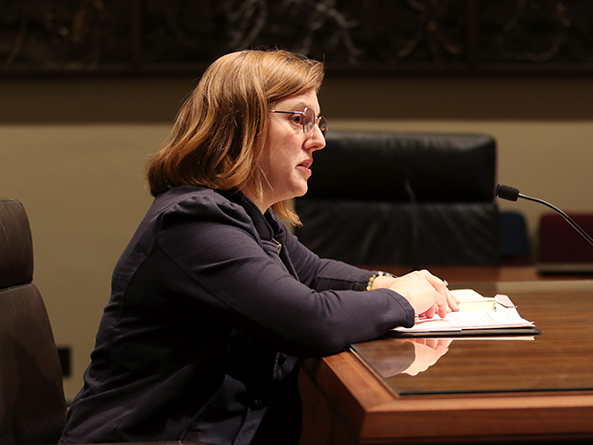Bill would require annual TANF report
The Health and Human Services Committee considered a bill Feb. 28 that seeks to increase transparency regarding the use of Temporary Assistance for Needy Families program funds.

TANF is a federal block grant program that provides states with funding to help low-income families with children achieve economic self-sufficiency. At a minimum, states must use the funds to operate a cash assistance program and a mandatory work program.
Funds not utilized by the end of the year can be carried over for subsequent years and may be used for any allowable TANF purpose. Carryover balances are referred to as TANF rainy day funds. Allowable purposes include programs that:
● provide assistance to needy families so that children may remain and be cared for in their own homes;
● reduce the dependency of needy parents on government benefits by promoting job preparation, work and marriage;
● prevent and reduce the incidence of out-of-wedlock pregnancies; and
● encourage the formation and maintenance of two-parent families.
LB871, introduced by Omaha Sen. Machaela Cavanaugh, would require the state Department of Health and Human Services to submit an annual report to the Legislature by Nov. 1 of each year detailing current and anticipated TANF program expenditures. The report would include a description of each program or service funded by TANF, the number of people being served, total costs and expenditures and the TANF purpose met by each program or service.
Cavanaugh said the TANF rainy day fund has grown from $92 million in 2020 to over $125 million. Nebraska receives $56.6 million in federal tax dollars from the TANF block grant every year, she said, and the state’s failure to use those federal funds to the maximum extent possible is harmful to Nebraska’s children and families.
“It is the duty of this Legislature to ensure that all taxpayer resources are used efficiently and effectively,” Cavanaugh said. “The simple reporting requirement in this bill would assist us in that endeavor.”
The bill also would require the department to explain in the report how programs or services receiving TANF funds are more likely to help families achieve economic mobility and self-sufficiency than would an increase in expenditures to Aid to Dependent Children, the state’s direct cash assistance program.
Diane Amdor of Nebraska Appleseed testified in support of LB871. She said providing direct cash assistance is one of the best ways to help low-income Nebraska families with children achieve economic self-sufficiency.
Amdor also noted that the main issue raised in the most recent audit of TANF expenditures was the underutilization of the block grants and the rainy day fund.
“As of 2021, Nebraska was one of just 16 states with a TANF rainy day fund that contains more money than its annual TANF block grant,” Amdor said. “An increase in ADC expenditures is the fastest and most effective way to expend TANF funds.”
Rasna Sethi, policy analyst for OpenSky Policy Institute, also testified in support of the measure. While the TANF rainy day fund continues to grow, she said, the direct cash allotment under ADC has not been increased since 2015.
“It is not an efficient use of funds for Nebraskans to have such a large TANF rainy day fund,” Sethi said. “LB871 provides essential transparency and accountability for the use of taxpayer dollars and it provides additional data to assist program planners seeking to improve the effectiveness of TANF programs.”
Shannon Grotrian, director of the office of economic assistance at DHHS, testified in opposition to LB871 on behalf of the department.
The bill would require DHHS to “speculate” regarding whether the use of TANF dollars for certain services and programs is more beneficial than an increase in ADC payments would be, she said, but not all allowable TANF expenditures are designed to increase economic independence.
“For example, a program could very specifically be funded [to] reduce out of wedlock pregnancies, therefore it may not speak directly to economic self-sufficiency,” Grotrian said.
The committee took no immediate action on LB871.


